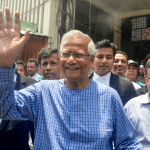President Conde Reshuffles Cabinet

In an attempt to quell months of anti-government riots and protests President Alpha Conde of Guinea has reshuffled his cabinet. Conde replaced by decree 13 out 33 ministers, the national state broadcaster reported.
Among the newcomers are two opposition leaders, a move widely seen as an attempt by the 80-year-old president to suppress mounting criticism against his rule.
Opposition leader, Mouctar Diallo was appointed youth minister, while former opposition spokesman, Aboubacar Sylla was chosen as minister of transport.
Conde also fired finance minister Maladho Kaba, replacing him with Guinea’s former ambassador to South Africa, Mamady Camara.
Security minister, Abdoul Camara was replaced by Alpha Ibrahima Keira, who counts as a loyalist.
Conde did not provide an official reason for the reshuffle, which comes a week after he replaced Prime Minister Mamady Youla with economist Ibrahima Fofana, in the hope of bolstering the West African nation’s struggling economy.
Guinea has experienced several riots and violent protests since local elections in February, which the opposition claimed were marred by vote rigging.
On May 18, the government resigned, a day after opposition parties suspended protests over disputed polls.
Prime Minister Mamady Youla presented his resignation and that of the whole government, said minister of state and presidential spokesman Kiridi Bangoura.
He told the media that the outgoing government will remain in charge of day-to-day tasks until a new government is drawn up.
Alpha Conde, a historic opponent who came to power in 2010, had promised to listen to the “silent majority” and then proceed with a “major cabinet reshuffle” to “put ministers who are listening to the population and who take care of their programmes “.
On Wednesday, opposition parties suspended street protests against the official outcome of local elections in February, saying the international community had offered to mediate.
Conde’s Rally of the Guinean People (RPG) party defeated a coalition led by the Union of Democratic Forces of Guinea (UFDG), according to the results.
On May 21, the opposition, resuming strike action by its supporters, brought trade and traffic to a standstill in parts of the capital Conakry.
The conflict in education ended a few days later, after an agreement on wages, but the opposition still contests the victory in the Feb. 4 local elections of the ruling party, the RPG, against the UFDG. Former Prime Minister Cellou Dalein Diallo, the main opponent of President Alpha Condé.
At the beginning of April, the opposition suspended its street demonstrations in order to initiate a dialogue with the authorities.









